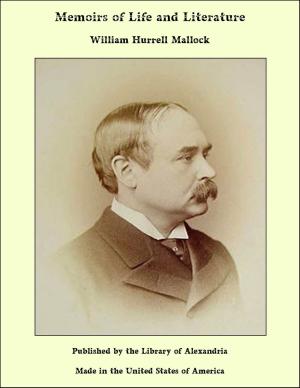The Fall of the Great Republic (1886-88)
Nonfiction, Religion & Spirituality, New Age, History, Fiction & Literature| Author: | Henry Standish Coverdale | ISBN: | 9781465620057 |
| Publisher: | Library of Alexandria | Publication: | March 8, 2015 |
| Imprint: | Language: | English |
| Author: | Henry Standish Coverdale |
| ISBN: | 9781465620057 |
| Publisher: | Library of Alexandria |
| Publication: | March 8, 2015 |
| Imprint: | |
| Language: | English |
It is my purpose to relate the fall of the Great Republic. I shall be brief, yet shall omit no detail necessary to a perfect comprehension of the causes which underlay the catastrophe and the events through which it came to pass. I shall set forth the curious sequence of ignorance, wickedness, and folly which led to the terrible result. I shall show how the boasted wisdom of the fathers became the inherited curse of their descendants. I shall describe the political and social revolution by which in a few months a nation of grand promise, and with a history unequalled for its century of growth and achievement, was transformed into the most pitiful wreck of all time. I shall narrate the story whose outcome has proved to the world the utter futility of the experiment of popular self-government, until men shall have attained a richer knowledge and a sweeter morality than thus far exist. The citizens of the United States felt at the close of the Civil War of 18611865 that they had demonstrated their ability to govern themselves wisely and successfully. They considered the experimental stage of their history passed, the volume completed and closed, the verdict rendered. They imagined the possibility of no greater strain on their institutions than had already been triumphantly endured. In truth, there was the appearance of reason in their conviction. No nation had ever more successfully passed the ordeal of civil strife. The magnanimity shown to the conquered rebels after the war, even after the assassination of Lincoln; the temperate endurance with which the country suffered the incubus of Johnson’s maudlin administration; the rapidity and ease with which the enormous war-debt was paid off; the general good-nature which averted bloodshed during the disputed election of 1876; the smoothness with which the administrative machinery bore the shock of Garfield’s murder,—all these events, coming closely after the vindication of the national idea and of personal liberty in the suppression of the Southern rebellion, convinced the people of the United States, and those of other lands as well, that “the experiment of popular self-government” had really achieved success. And yet there had been warnings enough of the volcano smouldering underfoot, if the eyes and ears of public men had been open to see and hear. Beginning at the time of President Garfield’s assassination, the one cry which went up from the common people, the working people of the land, was for years that of “Hard Times.” Business received a blow in that year from which it did not recover. Trade was slow and meagre; purchases of all sorts were made “from hand to mouth;” workshops and factories lay idle because there was insufficient demand for their products; men who felt keenly the disgrace of failure to support their families were compelled to beg for public aid to keep their humble homes and to supply even the most sordid demands of life. For years the country’s economic policy had been such as to poison the air with false doctrine and enervate the energies of commerce by vacillating action. It would be a bootless task to discuss now the relative merits of “Free-trade” and “Protection” to the United States. Perhaps either policy, adhered to with reasonable fidelity and administered, as to its details, with such common-sense as men are accustomed to use in the conduct of their private affairs, would have obviated the loss of work and the consequent poverty and want which filled the land, from 1882 to 1887, with a constantly deepening tide of misery. But the whole subject was made the shuttlecock of petty politics and pitiful politicians, until the nation ceased to have a policy which could be recognized or was of any avail as a stay before the sweep of commercial failure and pecuniary distress.
It is my purpose to relate the fall of the Great Republic. I shall be brief, yet shall omit no detail necessary to a perfect comprehension of the causes which underlay the catastrophe and the events through which it came to pass. I shall set forth the curious sequence of ignorance, wickedness, and folly which led to the terrible result. I shall show how the boasted wisdom of the fathers became the inherited curse of their descendants. I shall describe the political and social revolution by which in a few months a nation of grand promise, and with a history unequalled for its century of growth and achievement, was transformed into the most pitiful wreck of all time. I shall narrate the story whose outcome has proved to the world the utter futility of the experiment of popular self-government, until men shall have attained a richer knowledge and a sweeter morality than thus far exist. The citizens of the United States felt at the close of the Civil War of 18611865 that they had demonstrated their ability to govern themselves wisely and successfully. They considered the experimental stage of their history passed, the volume completed and closed, the verdict rendered. They imagined the possibility of no greater strain on their institutions than had already been triumphantly endured. In truth, there was the appearance of reason in their conviction. No nation had ever more successfully passed the ordeal of civil strife. The magnanimity shown to the conquered rebels after the war, even after the assassination of Lincoln; the temperate endurance with which the country suffered the incubus of Johnson’s maudlin administration; the rapidity and ease with which the enormous war-debt was paid off; the general good-nature which averted bloodshed during the disputed election of 1876; the smoothness with which the administrative machinery bore the shock of Garfield’s murder,—all these events, coming closely after the vindication of the national idea and of personal liberty in the suppression of the Southern rebellion, convinced the people of the United States, and those of other lands as well, that “the experiment of popular self-government” had really achieved success. And yet there had been warnings enough of the volcano smouldering underfoot, if the eyes and ears of public men had been open to see and hear. Beginning at the time of President Garfield’s assassination, the one cry which went up from the common people, the working people of the land, was for years that of “Hard Times.” Business received a blow in that year from which it did not recover. Trade was slow and meagre; purchases of all sorts were made “from hand to mouth;” workshops and factories lay idle because there was insufficient demand for their products; men who felt keenly the disgrace of failure to support their families were compelled to beg for public aid to keep their humble homes and to supply even the most sordid demands of life. For years the country’s economic policy had been such as to poison the air with false doctrine and enervate the energies of commerce by vacillating action. It would be a bootless task to discuss now the relative merits of “Free-trade” and “Protection” to the United States. Perhaps either policy, adhered to with reasonable fidelity and administered, as to its details, with such common-sense as men are accustomed to use in the conduct of their private affairs, would have obviated the loss of work and the consequent poverty and want which filled the land, from 1882 to 1887, with a constantly deepening tide of misery. But the whole subject was made the shuttlecock of petty politics and pitiful politicians, until the nation ceased to have a policy which could be recognized or was of any avail as a stay before the sweep of commercial failure and pecuniary distress.















